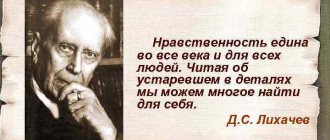Quotes and aphorisms about traditions
Tradition has a strange property of balancing good and evil, smoothing out, reconciling contradictions.
Rejection of tradition - even in the name of freedom - results in the destruction of the norms of human coexistence, the destruction of more or less acceptable forms of social behavior. Denis Dragunsky Traditions degenerate if they are not improved. Peter Pavlenko
Innovation is a tradition of breaking traditions. Sergey Averintsev
Life, devoid of tradition, feeds on an idea—or rather, ideas; and this happens until the winning idea itself becomes a tradition. Alexander Etkind
Everything (...) that is considered very old was once new. (...) And what we support today with examples will also someday become an example. Tacitus (55–117), Roman historian
Precedents are not just something to be followed; it is also something that needs to be created. Stephen Solages, US Congressman
The English, like no other nation in the world, have the ability to pour new wine into old wineskins, leaving them intact. Clement Attlee (1883–1967), British Prime Minister
A place of peace and reconciliation, where twenty generations of enmity are buried. (About Westminster Abbey.) Thomas Macaulay (1800-1859), English historian
The depth of our national memory is about seven minutes. Carl Bernstein (b.1944), American journalist who investigated the Watergate scandal
You can't change history by hanging portraits facing the wall. Jawaharlal Nehru (1889–1964), Prime Minister of India
Today's calendars poison the sweet simplicity of our lives, reminding us that every day we live is the anniversary of a number of completely uninteresting events. Oscar Wilde (1854–1900), English writer
Every autumn on November 7th we celebrate the birthday of the state, the destruction of which we celebrate on June 12th. Gleb Pavlovsky (b. 1951), Chairman of the Effective Politics Foundation
The dead rule the living. Auguste Comte
Tradition is just nostalgia walking around in public in full dress uniform. Andrew Marr
Traditionalists are pessimists about the future and optimists about the past. Lewis Mumford
Tradition cannot be inherited - it must be conquered. Thomas Stearns Eliot
Each era has its own flaws, which are added to the flaws of earlier eras; this is what we call humanity's heritage. Heinrich Heine
In the fight against authority and tradition, create tradition and authority. Grigory Landau
What sons have forgotten, grandchildren try to remember. Eilis Rossi
It's time to finally return the metro stations to the names they had before the revolution. Savely Tsypin
Tradition is the acquisition of experience without comprehension, the transfer of skill by skill. Alexander Kruglov
The traditions of all dead generations loom like a nightmare over the minds of the living. Karl Marx
Tradition is not the preservation of ashes, but the fanning of a fire. Jean Jaurès
Every tradition lives through interpretation. Paul Ricoeur
Tradition is the illusion of permanence. Woody Allen
Tradition is a set of solutions to problems that no one remembers. Paterson's principle
Tradition is what you turn to when you don't have the time or money to do the right thing. Kurt Alder
“Be true to your roots” is a liberal version of the slogan “Stay in your ghetto.” Mason Cooley
Some stereotypes become traditions over time. Sergei Sidorov
Tradition is that part of our past that we help move into the future. Victor Krotov
Tradition is a culture of ignorance. Alexander Kruglov
Tradition is the accumulation of ignorance. Mikhail Saltykov-Shchedrin
Many institutions and opinions have no other basis than ancient ignorance. Pierre Buast
Traditions are forms that are sanctified as their content fades away. Alexander Kruglov
Tradition is progress in the past; in the future, progress will become a tradition. Eluarl Herriot
Our human existence flows through countless traditions. Edmund Husserl
The entire cultural world in all its forms comes from tradition. Edmund Husserl
Modern attitude to cultural traditions
The diversity of traditions in most countries is sometimes amazing. What is common behavior for a certain nation will be taken as a personal insult in another state. It is not for nothing that tradition is considered one of the foundations of the cultural heritage of countries.
Therefore, when visiting an exotic place on the map, it is recommended to first thoroughly familiarize yourself with their “rules of conduct.” Otherwise, you risk finding yourself in an awkward situation or even provoking a conflict.
For example, in Turkey, one of the most important traditions is removing shoes before entering a temple or house. Also, under no circumstances refuse an offer to drink a cup of tea. This will be taken as an insult. Return to contents
Statements of great people about folk traditions
“Be true to your roots” is a liberal version of the slogan “Stay in your ghetto.”
The English, like no other nation in the world, have the ability to pour new wine into old wineskins, leaving them intact.
Our human existence flows through countless traditions.
The entire cultural world in all its forms comes from tradition.
Everything () that is considered very old was once new. () And what we support today with examples will also someday become an example.
Every tradition lives through interpretation.
The depth of our national memory is about seven minutes.
Life, devoid of tradition, feeds on an idea - or, rather, ideas, and this happens until the winning idea itself becomes a tradition.
You can't change history by hanging portraits facing the wall.
Every autumn on November 7th we celebrate the birthday of the state, the destruction of which we celebrate on June 12th.
The immutability and fidelity of traditions that some schools are proud of very often turn out to be only an appearance.
Some stereotypes become traditions over time.
Innovation is a tradition of breaking traditions.
A place of peace and reconciliation, where twenty generations of enmity are buried. (About Westminster Abbey.).
In essence, tradition is the preservation of what exists.
It's time to finally return the metro stations to the names they had before the revolution.
Precedents are not only something to be followed, they are also something to be created.
What sons have forgotten, grandchildren try to remember.
The traditions of all dead generations loom like a nightmare over the minds of the living.
Traditions degenerate if they are not improved.
Traditions are forms that are sanctified as their content fades away.
Tradition is a culture of ignorance.
Traditionalists are pessimists about the future and optimists about the past.
Traditional, rural cultures tend to stagnation, while revivalist cultures tend to develop.
Tradition cannot be inherited - it must be conquered.
Tradition has a strange property of balancing good and evil, smoothing out, reconciling contradictions. Rejection of tradition - even in the name of freedom - results in the destruction of the norms of human coexistence, the destruction of more or less acceptable forms of social behavior.
Tradition is just nostalgia walking around in public in full dress uniform.
Tradition is the accumulation of ignorance.
Tradition is that part of our past that we help move into the future.
Tradition is what you turn to when you don't have the time or money to do the right thing.
Tradition is oblivion of origins.
Tradition is the illusion of permanence.
Tradition is not the preservation of ashes, but the fanning of a fire.
Tradition is progress in the past; progress in the future will become tradition.
Each era has its own flaws, which are added to the flaws of earlier eras, this is what we call the heritage of humanity.
He who loses traditions slides downwards.
Source
Family traditions of the Russian people
Since ancient times, the traditions and customs of the Russian people have been honored and protected by people of all strata and statuses. The same cannot be said about representatives of modern society: many legends have become worthless and have sunk into oblivion. Some of them are simply ignored due to the penetration of Western cultural elements into our country and the change in moral values.
And yet, let's remember and list some examples of family traditions that Russian people once honored or still honor:
- careful preservation of the memory of one's ancestors. Each family had the custom of knowing all its relatives down to the tenth generation. For this purpose, a family tree was compiled, where the names and surnames of all relatives, their ranks and titles were entered. With the advent of cameras, photo albums began to be kept containing images of grandfathers and great-grandfathers;
- respect for elders. Unlike Europe, in Russia children still care for their parents until death. Rarely does anyone dare to place their elderly in a nursing home, and if this happens, the “dared soul” faces the condemning glances of loved ones. After the death of our parents, we take care of their graves for the rest of our lives, remember them on their birthday and commemorate them on the day of death;
- It is also a Russian custom to assign children a paternal patronymic (in the West, the patronymic can be anything). Thus, respect is shown for the man, the father of the family;
- transfer of family material assets by inheritance: among them there can be jewelry, a wedding dress, silverware or a cardboard box dear to the heart. These are heirlooms that have significance in a particular family;
- a lost family tradition is the preservation of a professional dynasty. For example, previously, if a person was a carpenter or a doctor, his sons and grandsons followed in his footsteps, passing on the secrets of craftsmanship to each other. In this period, such a phenomenon also exists, but rather as an exception rather than a rule.
It is necessary to preserve your family traditions: to know your family, your ancestors, because they are the ones who make us someone, give the meaning to our surname and the meaning of existence .
Author of the article: Liliya Sergeevna Kovalenko (psychologist)
Good luck to you! See you soon on the blog pages KtoNaNovenkogo.ru
Quotes about tradition
What sons have forgotten, grandchildren try to remember.
Tradition is that part of our past that we help move into the future.
Tradition is not the preservation of ashes, but the fanning of a fire.
Traditions degenerate if they are not improved.
He who loses traditions slides downwards.
Petr Nikolaevich Savitsky
Tradition is progress in the past; progress in the future will become tradition.
The traditions of all dead generations loom like a nightmare over the minds of the living.
Traditionalists are pessimists about the future and optimists about the past.
The entire cultural world in all its forms comes from tradition.
Tradition is what you turn to when you don't have the time or money to do the right thing.
Tradition is the acquisition of experience without comprehension, the transfer of skill by skill.
The English, like no other nation in the world, have the ability to pour new wine into old wineskins, leaving them intact.
Tradition is the accumulation of ignorance.
Precedents are not only something to be followed, they are also something to be created.
Tradition has a strange property of balancing good and evil, smoothing out, reconciling contradictions. Rejection of tradition - even in the name of freedom - results in the destruction of the norms of human coexistence, the destruction of more or less acceptable forms of social behavior.
Every tradition lives through interpretation.
The depth of our national memory is about seven minutes.
In essence, tradition is the preservation of what exists.
Hans Georg Gadamer
Definition - what is it?
Translated from Latin, the word “tradition” (traditio) literally means “ to transmit ,” that is, it represents an action.
In ancient times, it was used when transferring any material assets, for example, when giving a daughter in marriage or transferring a certain item. Later, intangible phenomena were added to material objects - skills and abilities .
Thus, traditions are something that is transmitted in a certain environment (society, group) and does not belong to a specific individual.
Further, the description of the term becomes more specific. It means something stable, unchanging, having a connection with the past, and not needing to be understood.
Tradition is something that has developed historically and is passed on as a set of cultural and social heritage and experience from person to person, from father to son.
This includes the following “traditional” components :
- customs (what are they?);
- behavioral habits;
- tastes;
- views;
- norms and rules;
- modes of action;
- skills and abilities.
Most often, “custom” is synonymous with “tradition.” In addition to it, the words “heritage” and “tradition” are used. With tradition in mind, we say “it’s customary, it’s customary, it’s customary,” which means an unwritten law that everyone adheres to.
For example, it so happened that on every New Year's Eve people set up a Christmas tree at home and decorate it with toys. Also, after the chiming clock, it is customary to set off festive fireworks and give each other gifts.
Another synonym that few people know about is the Russian word “itihasa,” meaning “so it was.”
Quotes about traditions
Tradition is a habit or skill passed down from generation to generation. Sometimes a custom turns into a cultural value, which they continue to follow even when they do not know why it appeared or why they need to do it that way. Beautiful quotes about traditions remind us of the value of such rituals.
In addition, customs are not always popular. There are family traditions that form a special culture that should be honored. It shows others what exactly should be valuable for people who want to become part of your social unit.
Concept of custom
This definition hides the way a person behaves in society. It is based on centuries-old habits that are the norm in a particular social group. Each member considers his behavior logical. And if some customs seem strange to an outsider, then the participants of this society do not see anything reprehensible in this.
The meaning of the word conceals a religious, cultural and legal order, which is sometimes coercive in nature. When it comes to customs, we mean the transfer from the older generation to the younger of numerous rites, rituals, special events and rules of behavior at funerals or weddings.







